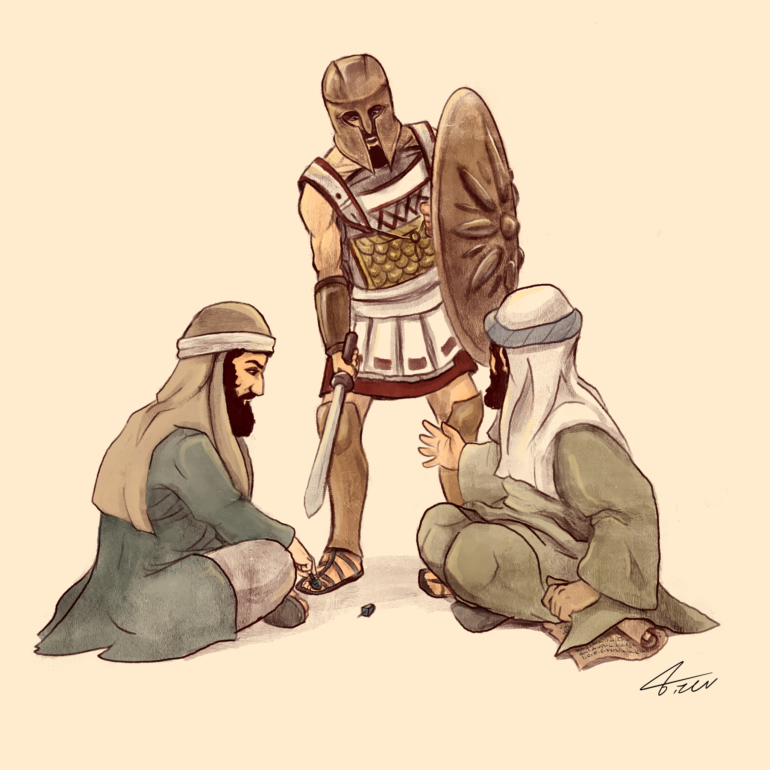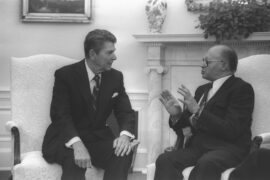The sixth chapter of a podcast series on the first Book of Maccabees.
For more content from VISION Magazine, subscribe to our newsletter and follow us on Twitter @VISION_Mag_, Facebook and YouTube. If you haven’t already, don’t forget to subscribe to our podcast on SoundCloud, iTunes, Stitcher, TuneIn, or Spotify and leave a rating and review to help us get our message out to a wider audience!
To support the podcast, head over to our PayPal portal and be sure to write a note that your contribution is for the podcast.
Hosted by: Robert Goodman
Transcript:
Shalom Aleikhem! And welcome back to Sefer Maccabim!
Last time we learned how Yehuda embarked on a mission into the Gilad east of Eretz Yisrael to save the trapped Jews over there, and returned successfully without a single Jew being killed.
Now we’re going to return to something we left off with back in chapter 3. You may remember that after the Maccabees’ victory at the battle of Beit Ḥoron Antiochus starts emptying his royal treasuries just to hire more mercenaries to fight the Jews. Then when he realizes he doesn’t have enough money, he embarks on a campaign into Persia to raise money by taxing the populations there under Greek control and hopefully reconquering the Parthians, who won independence from the Greeks several decades before.
So Antiochus is marching east through Persia and makes a beeline for a certain city he’s heard about; this city contains a temple piled with riches left there by Alexander the Great more than a hundred years previously. Antiochus thinks it’ll do very nicely to fill his treasuries.
So he tries to take the city and raid the temple, because the city’s inhabitants, having heard the king was after their temple of riches, rose up against the king and fought him in battle, and Antiochus has no choice but to turn round and flee back to Mesopotamia. While he’s there trying to figure out what to do next, a messenger comes and brings him the terrible news from Judea: that the Jews overcame Lysias and his huge army, pulled down the pagan altar Antiochus had set up in Jerusalem and rededicated their temple, and fortified the city of Beit Tzur, which the Seleucids had once used as a garrison.
When Antiochus hears this terrible news he is so shocked that he becomes sick and falls into bed. Many days pass, and Antiochus remains sick with grief. In fact, his condition is deteriorating and he realizes that he hasn’t got long left. So he calls his friends round his bedside and addresses them, “I once possessed great wealth and power, but I remember how I ransacked all the gold from Jerusalem and decreed her inhabitants must be destroyed. This, I believe, is the reason all this misfortune has befallen me.”
Incredibly, it seems that Antiochus is doing a tshuva of sorts, or if not a proper tshuva at least he seems to recognize the wrong he did. Not that I’m claiming this exonerates him, but I guess it’s something.
After this, Antiochus calls Phillip, one of his close friends who’d been with him throughout his campaign, and appoints him as regent of the empire. Not as king – that position is reserved exclusively for Antiochus’s son Antiochus V. But Phillip will now be in charge of running the kingdom’s affairs and helping to raise the nine-year-old Antiochus V to be the next king. Then, around four years after the start of the revolt, Antiochus IV Epiphanes dies in Babylon. When Lysias, the nobleman who Antiochus originally left in charge, hears of the king’s death, he crowns Antiochus V, known as Antiochus Eupator, as the new Seleucid king.
As the text tells us, around this time the mercenaries shut up in the Acra start to make trouble, they besiege the Beit HaMikdash and start – or rather, resume – their harassing the Jews living there. Yehuda HaMaccabi refuses to stand for this, and calls all the God-fearing Jews together to besiege the Acra with catapults and other engines of war. A few of the mercenaries, however, slip through the siege and make their way north to Antioch together with some Hellenist Jews, where they meet up with Lysias and the boy king Antiochus V.
They have some complaints to make: “My king, we were loyal to your father and we pledge loyalty to you as well. But back in Judea there’s a bunch of rebellious Jews who refuse to obey your orders. They shut us, your loyal subjects, up in the tower, they kill all of us they can reach, they’ve built up their sanctuary and their garrison at Beit Tzur, they’re going completely wild! Unless you step in to stop them, they’ll do even worse things and you will lose all control over them. Stop these rebels! You cannot delay!”
So the Greeks and Hellenists completely slander the Maccabees to the new king. As can be expected, the nine-year-old king gets very angry – here he is being told about a bunch of strange people who refuse to recognize his authority and apparently go around murdering those who do. Why wouldn’t he get angry? Antiochus V orders another army be mobilized and sent into Judea, and the scene is shaping up for another significant battle.
This time, the Seleucid army is even larger than before. It contains a hundred thousand foot soldiers, twenty thousand cavalry, and two hundred and thirty elephants. The Greeks hired these elephants from India because elephants were the war tanks of the ancient world – several meters high, clad in chainmail armor, fitted with brass helmets, fed on grape and mulberry juices to stir up their tempers and make them ready to cause as much damage as possible in battle.
Their riders, who came from India with the elephants, would sit protected in wooden towers atop the elephants and rain down arrows and other projectiles, and soldiers would march alongside the elephant wherever it went. They were truly formidable beasts, and it’s not hard to see why the Seleucids went to such lengths to hire them.
The Greeks were, however, violating a treaty made with Rome by bringing the elephants in the first place. Remember that even before the Maccabean revolt the Greek’s military dominion was starting to decline and Rome was becoming the power to be reckoned with, especially in the western Mediterranean area.
After a series of Roman victories over the Seleucids several decades before the Maccabean revolt, the Roman senate forced Antiochus III, father of Antiochus Epiphanes, to withdraw his troops from most of Europe, surrender all war elephants, and limit his navy to just twelve warships, besides no longer being able to recruit mercenaries for his army from Roman territory. Much like the infamous Treaty of Versailles Germany was forced to sign at the close of World War I, this treaty, which became known as the Treaty of Apamea after the location in modern-day Turkey where it was signed, essentially decimated the size of the Seleucid military and ensured they would never be a power to rival Rome. So by breaking this treaty the Seleucids risked bringing down Rome’s wrath upon them, but apparently Lysias and Antiochus were desperate enough that the hope of bringing Judea back under their control was to them worth the risk.
So this huge Seleucid army enters Judea from the south. First they try to capture Beit Tzur in the Judean hills, but the Jews who conquered it prior to the rededication of Yerushalayim have fortified it well, as we learned at the very end of chapter 4, and they successfully fend off the invading Seleucid army. Undeterred, Lysias and Antiochus try again, this time approaching from Beit Zakharia, (which today is located south-west of Yerushalayim).
Yehuda is forced to lift his siege on the Acra and move his forces south to Beit Zakharia.
Very early in the morning the king rises to ready his army, and the battle is imminent. The Maccabees are readied in the hills with their arrows, but suddenly they hear an awful sound unlike anything they’ve heard before: a dreadful stomping from the elephants’ feet, the terrible rattling of their harnesses, the roars from the huge army marching with the elephants, and the Jews are scared. Seriously scared. They think they might be outmatched.
As the first of the great beasts come into view, the sun reflecting off their metal armor make the mountains light up like lamps of fire. And as the rest of the army come into view, fifty thousand foot soldiers behind the thirty fearsome elephants, the Jews shrink back in fear.
Yehuda, as always, leads his men in a charge against the army and slay six hundred mercenaries, but it’s not enough. The army is advancing.
At this point, Yehuda’s younger brother, Elazar HaAvarani, the fourth son of Matityahu, sees one of the elephants bigger than the rest bedecked with a royal banner, and he thinks, that must be the elephant the king is riding upon. And he charges into the battle slaying soldiers left and right, heading straight for the royal elephant. Unbeknown to Elazar, this elephant was not actually the one the king was riding on, but only happened to be bearing the royal seal. Elazar throws himself underneath the elephant and plunges his spear deep into its soft underside. The elephant is instantly slain, but before Elazar has time to crawl out from under it, the elephant’s carcass falls down on top of him and crushes him. Elazar ben Matityahu is niftar.
Stricken and demoralized, the Jews retreat, and it’s the first time in the entire war that the Seleucids have won a battle against the Maccabees. [L’havdil, I’m reminded of the third Harry Potter where Harry suffers his first loss in a Quidditch match after being attacked by dementors and falling off his broom. But I digress.]
The Maccabees retreat to Jerusalem and, encouraged by their victory, Lysias and Antiochus march north with their army and besiege the holy city. They also besiege Beit Tzur and hope to recapture it from the Jews. But as it turns out, the Jews there surrender without a fight and the Greeks are able to take the city with no casualties. Why? The year is 3626 since creation, and it’s also a Shmita year, just like this year. This means the Jews have not been able to farm the land, and don’t have sufficient food supplies to be able to withstand a siege. So they surrender from the outset.
Meanwhile, back in Jerusalem, the siege is taking its toll on both the Jews inside and the Greeks outside. For many days the Greeks’ war engines rain rocks and other projectiles against the Jews in the city, and the Jews use their engines against the Greeks. The Greeks’ food supplies are running low, and the Jews in the city have run out of food, and because it’s a Shmita year, they cannot go and collect anymore. Famine is spreading, the situation is deteriorating and the Jews are close to giving up.
At that time, however, Lysias hears news that the situation back in Antioch has taken an unexpected turn. Phillip, whom Antiochus IV appointed as regent of the empire while on his deathbed, has arrived back from Babylon and proclaimed himself as king. Lysias is now faced with a political issue which requires him to return to Antioch to oust Phillip and secure the throne for Antiochus V. So Lysias offers the Jews a truce: You stop your fighting, you give up trying to win independence for yourselves, and we’ll leave you alone. No more persecution, no more us attempting to force Greek culture on you, we’ll let you live as you want, you can live the ways of your people. Provided you remain part of our empire and don’t insist on fighting for independence.
Now this is where it gets interesting. You might remember how back in chapter 2 we learned how the Jewish army was not autonomous, but was comprised of two main groups of Jews: the minority, the Maccabim, consisting now of Yehuda and his core followers, who’s desire is to liberate Eretz Yisrael from foreign rule. And the majority, the Ḥassidim, whose wish is to live in the ways of their ancestors and are willing to fight the Greeks who prevent them from doing so.
Until now the Maccabim and Ḥassidim have been fighting as one man with one heart. But now, presented with this truce, the difference in their motives becomes very apparent: the Ḥassidim say, “Sure, let’s accept it! They’re agreeing to stop persecuting us and let us live by the Torah of our fathers! It’s a no brainer!”
But Yehuda and his core followers reject the truce, saying, “We are not merely fighting to be free to live as our ancestors lived; we are fighting to free Eretz Yisrael from foreign rule and achieve political sovereignty in this land. The only way we can be sure long-term of being free to live the Torah of our fathers is by achieving political independence here. As such we cannot accept this truce, since it involves our remaining part of the Seleucid Empire.”
Passively, however, the truce is accepted, because if the Maccabim go out to war against the Seleucids their forces would be depleted because the Ḥassidim wouldn’t go out to fight with them, and Lysias does anyway need to end the siege and return to Antioch. Upon seeing the Jews appear to accept his truce, as a gesture of peace Lysias takes Menelaus, the Hellenist Kohen Gadol appointed by Antiochus IV who was responsible for stirring up much of the conflict between the Jews and Seleucids, and has him suffocated in a tower of ashes.
So the siege on Jerusalem is lifted, Lysias and Antiochus V return to Antioch, successfully kill Phillip and re-establish Antiochus V as king, and Judea is left in relative peace.
The sages also declared the day the siege was lifted, the 28th of the month of Shvat, as a minor holiday, as we learn from Megillat Taanit, a document containing all the minor holidays established by the sages in the times of the Beit HaMikdash. The 28th of Shvat was observed as a minor ḥag until the destruction of the second Beit HaMikdash some 200 years later.
And this is how the situation stands at the end of chapter 6: Antiochus V reigns with Lysias as his regent, the Ḥassidim have mostly returned to their homes and families, the Maccabees are in control of Yerushalayim, and Judea is enjoying a period of relative quiet.
Until the next chapter.





